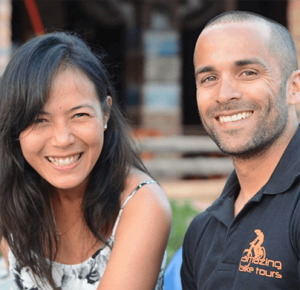The first sip of a perfect cuppa is always pure pleasure, but which leaves make the best brew? Taiwanese tea sits alongside the finest from India and China in terms of quality, thanks to the island’s mountainous landscapes, which provide ideal growing conditions for the delicate leaves. Tea has thus become central to Taiwanese culture, and you’re very likely to be offered some if you visit Taiwan. We’ve searched out some of Taiwan’s top teas – which will you try first?

Taiwan Teas
Oolong
Oolong is often talked of as the crème-de-la-crème of cuppas for its superior quality and distinctive flavour, and the premium varieties have a high price tag to match. Unlike black tea, which is 100% fermented (or oxidised), oolong is tea fermented anywhere between 8 and 90%, which means the flavour of different oolongs can vary greatly. The leaves are exposed to strong sun during growth, and allowed to oxidise after picking, before being rolled into long twists or curled ‘pearls’, with meticulous attention paid at every stage to achieve each variety’s distinctive characteristics. The flavours range from delicate and floral to rich and nutty, all with a deep sweetness and refreshing lift. Some lighter varieties are flavoured with aromatic herbs and flowers, such as mint or lavender, to enhance the drink’s natural notes.
Where to drink it: Take a trip to Pinglin District in rural northern Taiwan, where around 80% of the population work in the tea industry. Visit the Tea Museum and try Whenshan Baozhong, the lightly-fermented and floral Pouchong oolong grown there.
Black tea
Black tea is the type that most Western tea drinkers are familiar with. From English Breakfast blends to smoky Lapsang Souchong, many of our most cherished brews are produced from black tea. This process involves fully oxidising the leaves before roasting or smoking them, resulting in the robust infusions we know so well. During the 1920s, Assam plants were introduced to certain regions of Taiwan where they thrived, leading to the development of a unique cultivar called Tea #18, or Red Jade. This specialist Taiwanese tea has spicy notes of cinnamon and cloves thanks to the loose soils allowing the roots to penetrate deep into the earth and develop a more complex flavour.
Where to drink it: The lands surrounding Sun Moon Lake are dotted with tea fields producing Assam and Red Jade. Enjoying a cup of this rusty-hued infusion as the sun sinks low over the water is a beautiful way to spend an afternoon. There’s even an annual World Tea Expo in Nantou where enthusiasts can learn all about their favourite brew.
Green tea
Compared to the prevalent oolong varieties, green tea is a minority crop in Taiwan, but those grown there have a distinctive flavour profile. Green tea is not fermented, the fresh leaves being taken straight to the ‘panning’ stage which fixes the tea to prevent oxidisation. Sharp, bitter flavours give way to a softer citrus sweetness, ideal for awakening the senses first thing in the morning, and the infusion is sometimes said to have antioxidant properties and other health benefits. Dragon Well (Longjing) and Green Snail Spring (Biluochun), both premium varieties grown in Taiwan’s ideal conditions, are of such high quality that thousands of kilos are exported to the Japanese market each year.
Where to drink it: Take a trip to Sanxia District in Taipei, where you can sip a pot of the translucent, jade-toned beverage in the region where it is grown.
Matcha and Green Milk Tea
Matcha has developed an almost evangelical following in recent years, and many matcha-flavoured items, from soba noodles to ice-cream, are now easily available in major cities. True matcha, as used in Japanese tea ceremonies, is a powder made from finely-ground green tea leaves which have gone through a special process to increase their chlorophyll content. It has a grassy, umami taste which is perhaps best described simply as ‘green’, and is usually whisked into hot water then consumed in its entirety (rather than as an infusion). In Taiwan, a version of this green tea powder is often drunk in milk tea, which is a little like Indian spiced chai – sweet, aromatic, creamy and comforting – with the matcha flavour adding something savoury and slightly spinachy. The caffeine content is pretty high though, due to consuming the whole leaf, so go gently!
Where to drink it: You can buy instant green milk tea in sachets from any supermarket in Taiwan, to which you simply add hot water and enjoy for a quick savoury-sweet hit. If you want to try more matcha-flavoured delights, head for the hotly-tipped Myowa Café in Taipei for matcha fondue, matcha lava cake, or the extravaganza that is the matcha hot plate.
Bubble tea
One of the quirkier developments on the Taiwanese tea scene is bubble tea. Also known as pearl milk tea or boba tea, this unusual trend began in the 1980s and has gradually spread its wings worldwide. The original beverage consists of black tea, sometimes mixed with condensed milk, to which small, black tapioca pearls are added. These ‘bubbles’, cooked to a chewy consistency, are quite filling, so as you sip the tea through an uber-thick straw you have both a drink and a snack!
Since its conception, bubble tea has evolved and is now made with a variety of bases including tea, milk and fruit juices. The possible additions have moved on from the traditional tapioca pearls to include coconut jelly and popping boba, which release light bursts of a different flavour – they’re a fun alternative to milkshakes and smoothies that is often vegan and gluten-free too.
Where to drink it: Thanks to its still-increasing global popularity, bubble tea bars are springing up in many cities, but Taiwan is where it has its most dedicated following. There are many bubble tea cafes to try all over the country – keep a boba diary and find your favourite combo.
Tea eggs
Though not actually a drink, no discussion of Taiwanese tea culture is complete without mentioning tea eggs. This much-loved Taiwanese snack consists of hard-boiled eggs which have had their shells cracked before being immersed in a liquor of tea, soy and spices. They are left overnight, by which time the tea has delicately flavoured the eggs and left a pretty crackle pattern on the surface. A little like the pickled egg phenomenon of fish and chip shops in the UK, tea eggs have taken on a greater cultural significance and are widely available in corner shops across the country.
You can now even get alternative flavours, such as raspberry.
Where to eat them: Almost universally available in Taiwanese 7-11 shops, you can grab one whenever you need a quick protein hit. The craze is yet to become popular outside of Taiwan though, but luckily it is easy to make your own at home.
For a sublime tea-house experience which combines all of the above, check out the foody heaven town of Jiufen. Only 20 minutes from Taipei, here you can enjoy a feast of delights at the Amei Tea House which is rumoured to have inspired the award-winning Studio Ghibli animation Spirited Away. Speak to our Destination Specialists about incorporating a visit into your Taiwan holiday. In the meantime, I’m off to put the kettle on…




